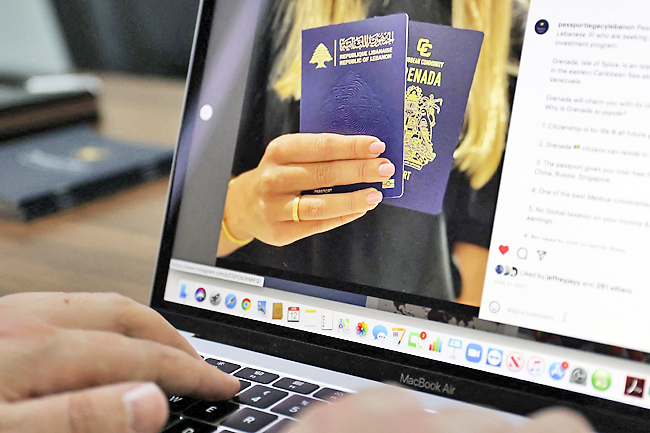BEIRUT (AFP) – Fearing visa hassles could cost him his job in Dubai while an economic collapse had dashed any homecoming options, Lebanese executive Jad splurged around USD135,000 on a new citizenship for himself and his wife.
Within a month of making the payment last year, the 43-year-old businessman received a small package in his mailbox.
Inside were two navy blue passports from the Caribbean island nation of Saint Kitts and Nevis – his ticket to visa-free access to over 150 countries, including in Europe.
This was a major upgrade from the Lebanese passport, which is ranked among the worst in the world and has become nearly impossible to renew because the cash-strapped state is running out of stocks.
“Three years ago, I would not have imagined I would buy a passport,” said Jad, who had previously grappled with lengthy visa procedures for business trips.
“But now because of the situation in Lebanon – and because we can afford it – we finally did it,” he said, asking for his full name to be withheld for privacy reasons.

A Saint Kitts passport ranks 25th in the world while Lebanon languishes at 103rd on the Henley passport index for freedom of travel.
With a population of less than 55,000, it started selling citizenships a year after gaining independence in 1983.
The citizenship by investment schemes have become a booming business internationally, attracting the well-to-do from volatile countries like Iraq, Yemen and Syria.
Some European Union (EU) member states, including Bulgaria, Cyprus and Malta, have also operated “golden passport” schemes, but they have run into opposition from the European Commission over the back door they offer to EU citizenship.
Wealthy Lebanese, mostly living in Gulf or African nations, are now among those hunting for passports that offer easier travel and a safety net from the economic crisis at home.
Caribbean nations are particularly attractive due to their long-standing schemes offering citizenship within months in exchange for a lump sum. And applicants are not even required to visit.
When Jad first went to Paris as a Kittitian, officers at passport control told him: “You come from a nice country.”
“But actually I have never been there,” he said.
Jad’s Lebanese friends in the Gulf were also shopping for “island passports” or investing in real estate in Greece and Portugal to obtain residency as part of so-called “golden visa” schemes, he said.
“This is not just a trend. It’s a solution.”
Lebanese expatriates in Gulf Arab states have long borne the brunt of political bickering and rifts between their capitals.
Last year, several Gulf countries cut diplomatic ties with Beirut for months after a Lebanese minister criticised a military intervention in Yemen.







